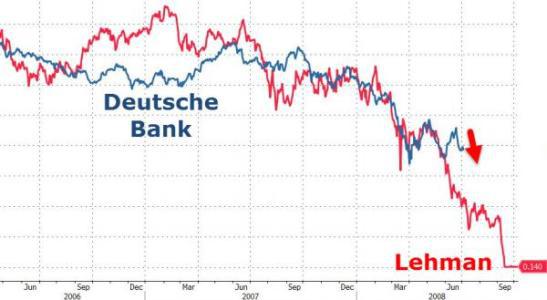This is a tale of changing environments and the organisms that are, as a result, dying off.
First, consider the bricks and mortar retailers. Amazon (NASDAQ:AMZN), the dominant online seller of virtually everything, reports a spectacular quarter with soaring sales and (fairly new for them) strong profits. But in a world of flat consumer spending, where families have already used up their savings, their kids’ college funds and the loose change in their sofas to make ends meet, one store’s feast is necessarily another’s famine. And the physical retailers — which require you to actually go to them in order to buy their stuff — now find the water hole dry and the trees barren of leaves. Here’s what Macy’s (NYSE:M) reported Wednesday morning:
Macy’s results reminiscent of financial crisis
(CNBC) – Macy’s dismal first-quarter results are bringing back unwelcome memories of the financial crisis, as the retailer on Wednesday reported two metrics that harken back to that period of economic malaise.During the first quarter, the department store chain said its comparable sales fell 5.6 percent. That marks a deceleration from its fourth-quarter same-store sales decline of 4.3 percent, and represents its most severe decrease in this metric since second quarter 2009. During that quarter, Macy’s comparable sales slid 9.5 percent.
Meanwhile, the retailer reported a 36 percent year-over-year drop in operating income. That not only marks its seventh straight quarter of year-over-year declines for this metric, but it is far steeper than any quarter during the Great Recession, said Ken Perkins, president of Retail Metrics. In second quarter 2009, by comparison, the retailer’s operating income fell closer to 10 percent.
It’s hard to see how Macy’s survives in its current form. But it might hang on longer than Italy’s major banks, which are saddled with a profligate and therefore ungovernable home country locked within a currency union managed by Germany for Germany. The result is catastrophic:
Tumbling Banco Popolare leads Italian bank shares lower
(Reuters) – Shares in Banco Popolare (MI:BAPO) plunged 14 percent on Wednesday after a surprise first-quarter loss driven by loan writedowns — the main focus of investor concerns over Italian banks.Banco Popolare booked loan writedowns requested by the European Central Bank as a condition for approving a planned merger with Banca Popolare di Milano that will create Italy’s third-biggest banking group.
To improve its loan loss provisions Banco Popolare must raise 1 billion euros in a share issue slated for early June.
Italian banks have lost nearly 40 percent of their market value so far this year, weighed down by concerns they could need additional capital to shoulder losses from sales of bad loans that rose to 360 billion euros ($410 billion) during a long recession.
A share rebound triggered by the hasty creation last month of the fund intended to inject capital into weaker lenders and buy their bad loans proved short-lived.
Banco Popolare said late on Tuesday that it had written down loans for 684 million euros in the first quarter, nearly four times more than in the same period of 2015, posting a net loss of 314 million euros for the first three months.
CEO Pierfrancesco Saviotti told an analyst call that the loan writedowns were the first step towards selling chunks of bad loans and that it would book further provisions this year.
He said the ECB wanted provisions to cover 62 percent of the most troubled loans up from a 60 percent coverage ratio the bank reached in the first quarter.
Bankers say other Italian banks are likely to follow in the steps of Banco Popolare and raise cash to make up for loan losses.
Loans to insolvent borrowers are valued on average at around 40 percent of their nominal value on Italian banks’ balance sheets but market prices for these assets reach at most 30-35 cents on the dollar when the loan is backed by a good-quality property.
The problem for both physical retailers and Italian banks is that the world continues to change in unfavorable ways. E-commerce keeps getting easier and more fun, and malls as a result keep getting emptier, with no end in sight. (Actually there is an end in sight, which is when most malls are cleared of bankrupt retailers and converted to refugee housing.)
As for Italian banks, the euro is up lately, which makes Italy that much less competitive on global markets and Italian borrowers that much less likely to cover their payments. And with interest rates trending ever-more-negative, there’s not much for even a well-run bank to do with excess capital these days.
Which leads inescapably to the conclusion that while Macy’s and the Italian banks are the weakest and therefore most vulnerable organisms in this ecosystem, they’re just the first to go. Other US retailers will report a string of bad numbers in the coming month and other banks around the world will follow the Italians’ lead. Here’s a Zero Hedge chart comparing the stock price of Germany’s iconic Deutsche Bank (NYSE:DB) to (iconic in a different way) Lehman Brothers pre-Great Recession:

As a result, in the coming year the dominant question will morph from “what to buy?” to “what crashes next?”
